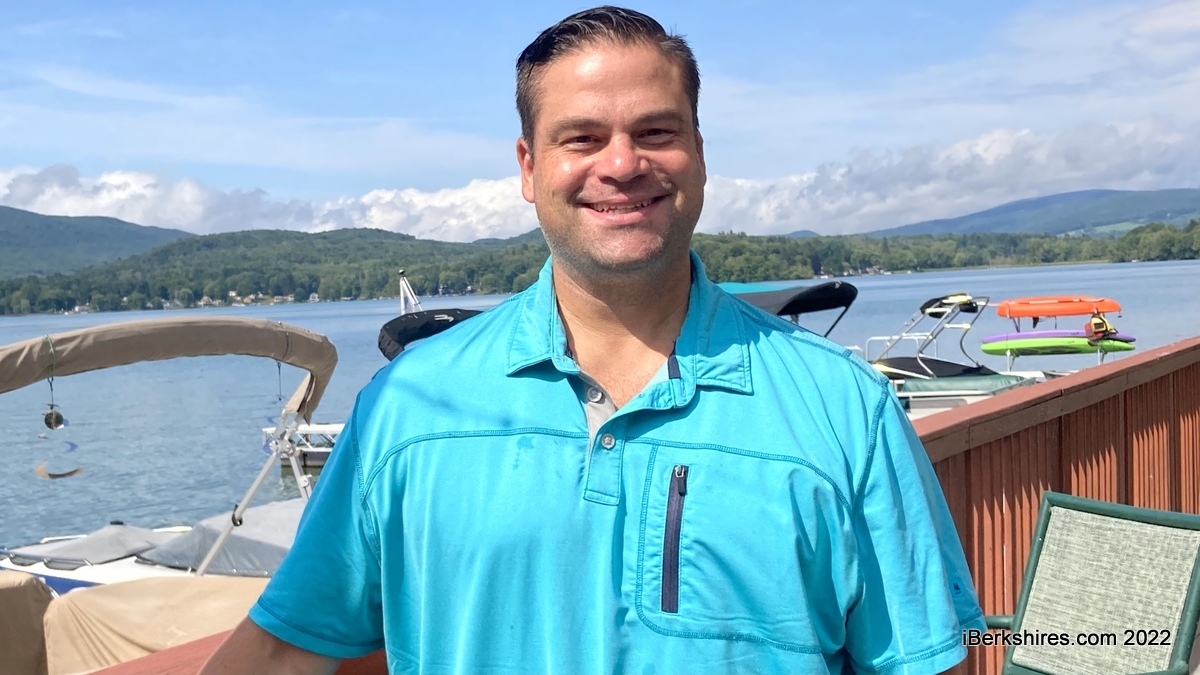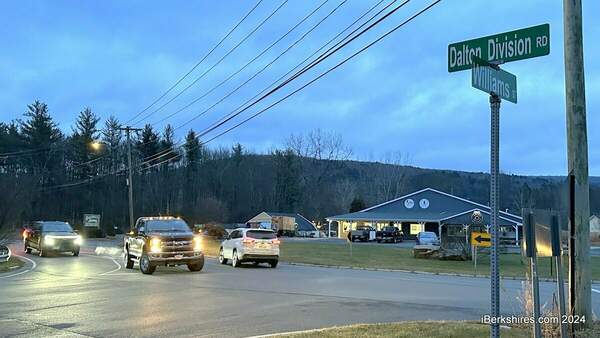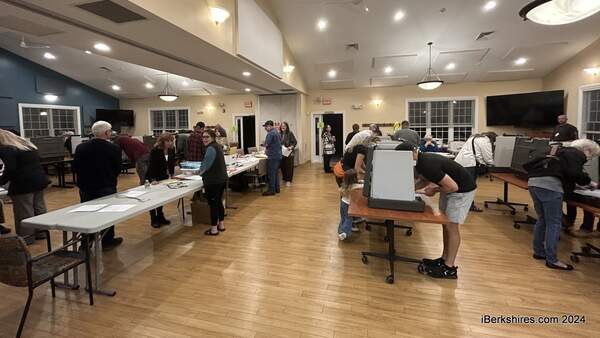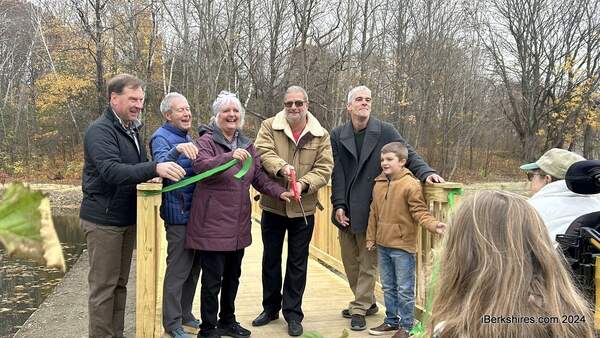

Barbalunga Seeks Fiscal Stewardship, Equity in Sheriff's Office
PITTSFIELD, Mass. — Alf Barbalunga wants to make sure the Berkshire County sheriff's office is fiscally responsible and equitable.
He's challenging incumbent Thomas Bowler's leadership over the past dozen years in the Democratic primary election on Sept. 6.
"It's been a dream of mine to run. I first started thinking about it when I was 6 years old. I was introduced to this sheriff at the time and I asked him, What do you do for work? And he told me he was the sheriff of Berkshire County and I said, 'What does that mean?' as a 6-year-old and he said, 'I'm in the business of helping people," Barbalunga said.
"So that resonated with me then differently, obviously now I'm an adult, but that's something that guided me throughout the years to be in basically the public safety business and really, what it comes down to is helping people in different ways."
Barbalunga has 28 years of combined corrections, law enforcement, and public safety experience and most recently as the chief probation officer of the Southern Berkshire District, from which he took a leave of absence for his campaign. He is also a former chair of the Pittsfield School Committee.
He has been preparing to run for 12 years and said people in the community encouraged him to enter this election.
His main campaign goals are to gain financial stewardship in the office's budget, to bring women inmates back to Berkshire County from the Western Mass Regional Women's Correctional Center in Chicopee, and to increase diversity within the department.
Barbalunga also wants to see inmates involved in work programs that will turn into jobs when they are released to prevent recidivism.
"We believe strongly that the money should be spent in a different way," he explained.
"At the end of the day should be spent on rehabilitation. That's what it focuses on and that gets down ultimately to walking out of there and having the ability to secure a job and actually work."
Barbalunga said his campaign is more treatment-oriented and that the incumbent's focus is more on law enforcement.
"There's no criticism, it's just a stylistic difference," he added. "We want to spend the money one way and they want to spend in a different way."
He wants to see the 160,000 square-foot Berkshire County House of Corrections used to its capacity and for the taxpayers' money to be maximized, claiming that neither is being done in this administration.
The candidate feels strongly about bringing female inmates home from the Chicopee facility, claiming that "separate but equal is not equal." This has been a hot topic in debates and he has expressed concern for the inmates being far from their support networks and families, among other criticisms.
He argues that there is space at the Cheshire Road facility for women, recognizing that the population is "tougher" to treat and requires more effort.
"We want to reunite them with their families, their support services, their legal services up here, their children, and more importantly, we want to create a brand up here that's better than Hampden County and we can do it," Barbalunga asserted.
"In general, I'm just not a huge fan of people that say we can't get the job done, we don't have the money, we don't have the employees, we don't have the connections to the legislator, we don't have an intimate relationship with the speaker of the House. All that is excuse oriented and it's not tolerable for me and for my team."
He also wants to adjust the cultural diversity of the office and develop a "legitimate" promotional scoring system, claiming that there is not one person of color on the executive leadership team.
"One of the positions that we're going to key in, which is amazing they don't have one, is like a cultural diversity inclusivity officer," he added.
"That would be what we call an executive leadership position. What that means is we're not just talking the talk and walking the walk, we're going to actually commit to individuals like that with appropriate salary points to make sure that the outreach is going to the community."
Other goals include creating a regional lockup to take the pressure off of separate police departments, building out the facility to house juveniles, and closing the former jail on Second Street and giving it back to the community.
Question: What is your relevant experience and how has it prepared you?
"I worked for three different sheriffs, five facilities, nobody's ever done that in a campaign like this, I mean, I was a line correctional officer. It doesn't get any lower than me. It's a wonderful job. It's what started this journey along with that conversation with my sheriff so I've seen it all," he said.
"I want to get up there. I want to work. I'm excited. I want to show up to work. That's another thing that's a difference. I want to go to work. I want to touch points with all three shifts, seven days a week. I want to lead by example. I want to get that place running correctly and again like I said, I know there's things that we're we're not gonna be able to solve in the first 90-day benchmark, I get it, but we can set the tone and start it.
"We get up there, full transparency. When I mean transparency, good, bad, and ugly. I've done it everywhere in my job and again, most of it's good — couple bad things, occasionally an ugly thing — but it's transparent.
"And then what we do is we pivot from that. We did a great job, when I do a great job, I will tell you how great I'm doing, we're gonna create awards for it, when we do something bad, we're gonna own it and say, 'Hey, this didn't work out like we thought, we're gonna fix it,' and we're gonna move on, maybe there's an apology, maybe there's not, but we're gonna fix the operation."
Question: What issues have you heard from the community during your campaign? Are any of them new to you?
He said his proposals for fiscal discipline, a self-imposed two-term limit, and his willingness to debate have resonated well with the community.
"'People have had enough. That's the bottom line," he said.
"People know if you had eight executive team positions back in 2010 and now you have 14 — let's forget that there's not a Black person or a Latino person or an Asian person or anything like that, let's forget that whole narrative — and you know you have one-third of the work, one-third, that does not compute with normal people."
Barbalunga added that people are also bothered by staff members making more than $100,000 a year and not living in Berkshire County.
Question: What are the main changes you would make to the sheriff's office budget?
The candidate said his campaign team has identified more than $450,000 in cost savings to the budget "right out of the gate."
Some of the sheriff's leadership team has said they will retire if Bowler is not in the office, he said, adding that this presents an opportunity to cut down costs by not replacing them.
"We don't want to see anybody go. There's some wonderful talent out there but we also understand loyalty to the incumbent," he said.
"And by retiring, here's what it gets out of (it): we don't have to fill those positions. Just two positions alone. You're over $300,000. Bingo, right out of the gate. We don't have to fill anything. There's also the ability to readjust some of the employee job descriptions out there and pivot them to help contribute in different areas and there'll be some cost savings with that."
He also spoke of doing an inventory of all the vehicles and other equipment that the office has to see what is necessary.
Question: Can you expand on the steps that you would take to bring women home from the Chicopee facility?
Barbalunga explained that he would first contact Hampden County Sheriff Nick Cocchi with his intentions and then bring back detainees first.
"These are people that haven't even been convicted. These are women that maybe didn't have $40 and they're sitting in Chicopee ripped out here," he said.
"So it's not fair. They should not be down there and you got to remember, they can't control their environment, they can't make a decision, say, 'Hey, I wanted to go there, I didn't want to go there.'"
He wants to dedicate two of the jail's eight pods to women, which would be around 72 cells.
"Sight, sound is what the key on this is, " Barbalunga said. "That basically means you and I can both be inmates up there, you're the woman I'm the man, we just can't see or hear each other. That's what it gets down to and now there's an exception with transportation and vans."
Question: What would you do to ensure that inmates are being hired from work programs once released?
"That's all that matters, or that's one of the priorities for sure," Barbalunga said.
The first thing he would do is utilize the Pittsfield Community Justice Program to prepare inmates for post-incarceration. The original statute reportedly called for participation with probation, parole, and the sheriff's office.
"Our goal is always this: if you're an inmate and you're classified appropriately, we don't want you up in the house correction, we want you in the community," he said.
"We want you learning, we want you working, we want you performing community service and giving back, we want you out, and then we want coming back at night for your meal and any other efforts we have to instill --whether it's a health issue, whatever it is-- and then we want you go to bed and then the next morning, we want you waking up and doing the same thing. That's the point. Nobody here wins when people are warehoused with no skill sets."
Question: You have sent out a lot of press releases, what is the reasoning behind this tactic?
Barbalunga has sent out nearly 30 press releases to media outlets and the community to pitch his campaign directly.
"The reason is simple. It's education. We want you to be armed with information. If you like what the sheriff has been doing, bad luck for us, it's not looking good for us in this campaign. If you don't like, we're giving you a choice," he said, adding that there should be four candidates in the race to give people choices.
"There should be people of color, there should be women but can you imagine, I've been around the block, I'm quasi sophisticated when it comes to public service and state service, I've been in 30 years, the amount of effort that they put into keeping me out of running, can you imagine just Suzie Q, who wants to do the right thing and run, how much she would get ground down and beaten down to try to run?" Barbalunga said.
"There was a reason. They don't want any exposure. Anybody running. So these press releases are (to) educate everybody. Here's what's going on. Great information. Like I said, it's sourced it's sited, it's verifiable. There's nothing in there that's not 100 — Of course, we're not perfect, right? But it's close. Everything is wonderful, wonderful content."
Tags: election 2022, primary,
















